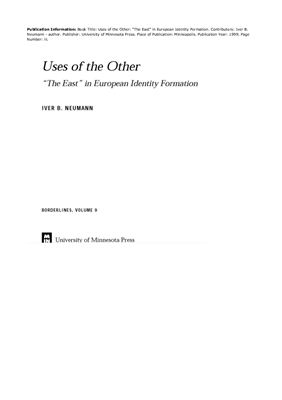Examines identity politics in the context of inteational
relations.
The field of inteational relations has recently witnessed a tremendous growth of interest in the theme of identity and its formation, construction, and deconstruction. In Uses of the Other, Iver B. Neumann demonstrates how thinking about identity in terms of the self and other may prove highly useful in the study of world politics.
Neumann begins by tracing the four different paths along which this thinking has developed during this century—ethnographic, psychological, Continental philosophical, and "Easte excursion"—and he shows how these blended at the margins of the discipline of inteational relations at the end of the 1980s. There follow several incisive readings of European identity formations on the all-European, regional, and national levels.
The theme that draws these readings together is how "the East" is used as a sign of otheess at all three levels. Whereas previous studies framed this process as part of colonial and postcolonial developments, this book suggests that "Easteness" is also present as a marker in contemporary discourses about Russia, Turkey, Central Europe, and Bashkortostan, among others.
Situating his work in contemporary critical debates, Neumann argues that, while the self/other perspective is always of relevance, it is now more in need of being used as a perspective on specific sequences of identity formation than of further embellishment.
1. Uses of the Other in World Politics
2. Making Europe: The Turkish Other
3. Making Europe: The Russian Other
4. Making Regions: Northe Europe
5. Making Regions: Central Europe
6. Making Nations: Russia
7. Making Nations: Bashkortostan
8. Conclusion: Self and Other after the Death of the Sovereign Subject.
The field of inteational relations has recently witnessed a tremendous growth of interest in the theme of identity and its formation, construction, and deconstruction. In Uses of the Other, Iver B. Neumann demonstrates how thinking about identity in terms of the self and other may prove highly useful in the study of world politics.
Neumann begins by tracing the four different paths along which this thinking has developed during this century—ethnographic, psychological, Continental philosophical, and "Easte excursion"—and he shows how these blended at the margins of the discipline of inteational relations at the end of the 1980s. There follow several incisive readings of European identity formations on the all-European, regional, and national levels.
The theme that draws these readings together is how "the East" is used as a sign of otheess at all three levels. Whereas previous studies framed this process as part of colonial and postcolonial developments, this book suggests that "Easteness" is also present as a marker in contemporary discourses about Russia, Turkey, Central Europe, and Bashkortostan, among others.
Situating his work in contemporary critical debates, Neumann argues that, while the self/other perspective is always of relevance, it is now more in need of being used as a perspective on specific sequences of identity formation than of further embellishment.
1. Uses of the Other in World Politics
2. Making Europe: The Turkish Other
3. Making Europe: The Russian Other
4. Making Regions: Northe Europe
5. Making Regions: Central Europe
6. Making Nations: Russia
7. Making Nations: Bashkortostan
8. Conclusion: Self and Other after the Death of the Sovereign Subject.

